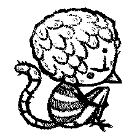88
,d ,d 88
88 88 88
MM88MMM ,adPPYba, ,adPPYba, MM88MMM 88,dPPYba,
88 a8P_____88 a8P_____88 88 88P' "8a
88 8PP""""""" 8PP""""""" 88 88 88
88, "8b, ,aa "8b, ,aa 88, 88 88
"Y888 `"Ybbd8"' `"Ybbd8"' "Y888 88 88
2025-11-08. When I first shared this post online I got a lot of comments from people who too had this same late-life realization with their teeth. We are not alone. Scroll to the bottom of the page for some recent updates to this post.
2024-10-15. As an adult I am embarrassed to say that I learned very late how to care for my teeth. It is difficult to admit this publicly, but I am sharing my experience so that others like me won't repeat my mistakes.
As a kid, I had access to yearly dentist services, courtesy of my parent's dental insurance, but as soon as I was on my own I stopped going because I couldn't afford to. My teeth were problem-free for most of my adult life, but I started having problems in my 30's.
I brushed my teeth once a day before bed, rinsed the toothpaste away with water afterwards, and would only floss when I had something stuck in my teeth. Growing up I was taught that this was enough. In my kid mind, a cavity was the worse thing that could happen. As an adult, it never occurred to me to look up how to brush my teeth again, oral health was a solved problem, what more was there to learn? Lots, apparently.
I went to the dentist last year because of a tooth ache, I couldn't chew food using the left side of my mouth. "When was your last dentist appointment?" The dentist asked me. I almost didn't want to answer, it had been over 10 years, although even if I hadn't said anything the evidence was all over my teeth. The ache was due to multiple cavities — nothing more serious, thankfully. I paid the bill out of pocket(2000$), because I still did not have dental insurance.
That same day, the dentist told me that my gums were prone to bleeding — an early sign of gingivitis. An alarm sounded in my mind, I would have many more high bills to pay if I didn't do something about this. Gingivitis can evolve into periodontitis, a more serious disorder that causes gum recession, damage to soft and hard tissues, and eventually tooth loss. I had evidently not mastered oral health, if I had I wouldn't have these problems.
I was now hellbent on keeping my teeth healthy. As always, prevention is best, but sadly my brain only cares when serious problems occur. While doing research, I found out that I wasn't brushing or flossing my teeth correctly, it was time to update my oral care routine! I try and visit the dentist once a year now, even if it's not cheap(although they'd prefer I visit every 6 months).
Disclaimer: I was wrong about my teeth once, I can be wrong again. I have researched the following thoroughly, but there may still be some mistakes. Kindly let me know if you find some.
The state of my teeth. Many of my problems are due to teeth crowding in my mouth, the result of wisdom teeth growing at an angle(but not emerging). My two siblings had theirs removed as kids, I do not know why mine weren't. In fact, one wisdom teeth, a late bloomer, decided to surface 3 years ago — yes, again in my 30's. This tooth continues to be a problem for me, it is difficult to clean because it sits lower than the other teeth at the back of my mouth. I am paying extra care to this tooth, but I fear that one day it'll cause me problems and that I'll have to pay to have it removed.
!!
/\ /\ /\ /\ /\ /\
| ` | | ` | 凸|◣ ◢|凸 <[I wanna watch
/ \ / \ / ∇ \ the world burn!]
\_,--./ \_,--./ \_,--../
`"""` `"""` `"""`
jgs(mods by rek)
Here is how I now care for my teeth:
- I floss my teeth right after my last meal of the day.
- After flossing my teeth I rinse with mouthwash*.
- I brush my teeth twice a day, when I wake up, and before I go to bed. I don't rinse with water.
*Note: I stopped using mouthwash once I went through the bottle. I used it initially to give my gums and teeth the best of chances to combat the early signs of gingivitis my mouth had exhibited.
Flossing
When flossing, I used to slip the floss in the gap in my teeth and pull it right out afterwards before moving on to the next gap — this wasn't the correct way to floss, I wasn't freeing accumulations near my gumline. Flossing is often necessary because normal toothbrushes can only reach two thirds of a tooth’s surface.
As mentioned before, I floss after my last meal of the day.
When flossing...
- I take a long length(25-50 cm | 10-20 inches) of floss and wrap each end around my two middle fingers until I have close to 5 cm (2 inches) of floss left in-between.
- I curve the floss so that it wraps against the side of the tooth I am cleaning, in a sort of exaggerated C-shape. I move the floss up and down gently, then invert the C-shape and clean the other tooth neighboring the one I just finished(in the same tooth gap).
- Every time I move to clean a new tooth, I use a clean section of floss.
- I rinse my mouth with water(or mouthwash) afterwards.
Mouthwash
Because my gums are currently showing signs of gingivitis, I am, for the moment(maybe not forever), using mouthwash after flossing my teeth (mouthwash isn't essential to oral health).
I don't use mouthwash after brushing my teeth because it washes away the fluoride(if using toothpaste with fluoride). I use an alcohol-free mouthwash.
When using mouthwash, I use the amount recommended on the bottle(20 ml | 4 tsps), and swish the liquid around in my mouth for 30 seconds. I spit the liquid, but I don't rinse my mouth. I wait at least 30 minutes before eating or drinking anything(even water). I don't rinse it away with water because mouthwash uses ingredients — like fluoride or antiseptics — that continue to act even after I spit it out, rinsing my mouth with water washes these beneficial compounds away.
More brushing doesn’t automatically equate to better oral health, the quality of the brushing matters a lot.
Brushing
When brushing my teeth, I used to brush too hard, damaging my gums, I also brushed back and forth(not against the gum line). Now, when brushing, I go slow. Dentists recommend brushing for at least 2 minutes, brushing less than this means not getting the benefits of fluoride toothpaste(if using a toothpaste with fluoride).
- Outside of the teeth. I start with the outside surfaces of my teeth. I go slow, tooth by tooth. I tilt the brush at a 45° angle, then move it in short strokes against the gum line.
- Inside of the teeth. I use the same technique as with the outside of my teeth, but I go slower, trying to pay attention to each tooth. Because I can't see what tooth I am brushing it is easy to skip one..
- Top of the teeth. I run the brush back and forth along the topsides of my teeth.
- Front teeth inside. In the end, I like to brush the inside of my front top and lower teeth, brushing against the gum line.
- Tongue. I brush my tongue.
- Rinsing. I spit out the toothpaste, but I do not rinse it away with water. The left-over toothpaste acts as a chemical to break down germs over time. There's not enough leftover in your mouth to cause problems, but enough to protect your teeth. I wait at least 30 minutes before eating or drinking.
Here are a few additional tips:
Soft-bristled toothbrush. Choose a soft-bristled toothbrush, it is more gentle on teeth. Toothbrushes with a small head that can reach the teeth at the back of the mouth are also important.
Don't brush your teeth right after eating. Rinsing with water after eating is fine. Brushing your teeth after a meal, especially if it's acidic, is not great because the enamel is a bit softer and it can damage your teeth. It is best to wait 30-60 minutes after brushing to avoid damaging the enamel.
In the morning, brush before breakfast, not after. During sleep, plaque-causing bacteria can proliferate. Brushing just after waking up can help remove these potentially harmful oral bacteria, increase saliva production and provide a protective barrier over the tooth enamel. Those who prefer to brush after eating breakfast ought to wait 30 minutes and avoid consuming acidic foods. (Note that this advice is primarily for those who are cavity-prone, you can brush right after breakfast, but if you use toothpaste with fluoride you'll wash away all of the benefits of using it).
Intolerances to SLS, fluoride... People sensitive to sodium lauryl sulfate (SLS, a common ingredient in toothpaste) sometimes get canker sores and skin peeling inside their mouths if exposed to it. Those with perioral dermatitis from fluoride, SLS, and cinnamon flavorings in toothpaste should switch to a brand of toothpaste containing hydroxyapatite instead.
Update
2025-11-07. Exactly one year after writing this I went to see my dentist again, and I am happy to report that my teeth and gums look great. My new oral care routine works. My gums aren't as sensitive as they were, and I didn't have much build-up on my teeth.
I am so, so glad that I was able to stick to this routine. I only used mouthwash for the first few months because I was concerned about gingivitis. I no longer use it, but I do brush and floss everyday in the manner described above.
I will continue on with this routine and will report back if anything changes after future dentist visits. My visits are now 100% covered by the Canadian Dental Care Plan(CDCP), a government program proposed by the NPD that began in 2025 and that aims to offer help to those like me who aren't insured. The coverage percentage varies depending on your income. If you also have low-income and live in Canada I highly recommend that you sign up, you and your teeth are worth it.
 About
About Projects
Projects Books
Books Games
Games Stories
Stories Store
Store Notes
Notes How-to
How-to